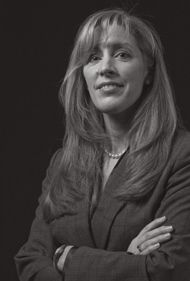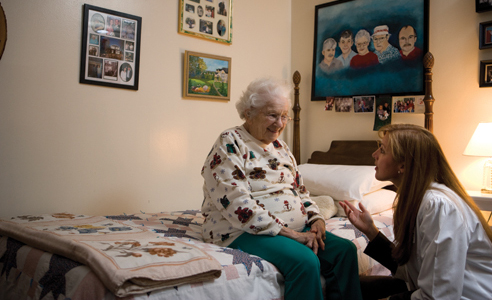Overcoming Obstacles by Articulating a Vision
Amy E. Cotton, MSN, FNP
Amy E. Cotton, MSN, FNP, began her career as a certified nurse’s aide, and has been a registered nurse for 22 years at Eastern Maine Healthcare Systems (EMHS), a regional network of hospitals, home care, nursing homes and primary care providers serving central, eastern, and northern Maine. As a staff nurse caring for older adults, Ms. Cotton was not satisfied with the quality of care her patients received. In the early 1990s, she wrote a proposal recommending that a geriatric nurse specialist be hired.

Amy E. Cotton, MSN, FNP
Ms. Cotton’s talents and enterprise were noticed and she was encouraged to move forward in her career. She obtained a masters degree and became a nurse practitioner. In 1997, she opened the Center for Healthy Aging, which is part of Rosscare, the older adult health services affiliate of EMHS. The Center for Healthy Aging is a clinic run by nurse practitioners that provides primary care and consultation services to frail elders having difficulty living at home due to memory loss or other health problems.
“In my career, I’ve found that if you’re a really good clinician you tend to get promoted,” says Ms. Cotton. “I’ve had wonderful opportunities,” she says, but admits that she was unprepared for many aspects of leadership, such as fiscal management, strategic planning, conflict resolution, and project leader-ship. This became especially apparent in 2005 when Ms. Cotton was promoted to Director of Operations at Rosscare. In addition to the Center for Healthy Aging, Rosscare includes a medical alarm program, a telephone reassurance program, a senior health information line, an assisted living facility, a retirement community, and four nursing homes. Ms. Cotton supervises 21 employees.
 Amy Cotton with resident, Geraldine Laliberte at Rosscare, Bangor, ME.
Amy Cotton with resident, Geraldine Laliberte at Rosscare, Bangor, ME.
Ms. Cotton’s main goal in her new position was to elevate the standard of care for older adults regardless of where they access health care. She wanted to measure quality using markers such as falls, medication errors, pressure ulcers, and patient satisfaction. She wanted to identify desired outcomes, and put systems in place to support best practices in health care. Ms. Cotton realized, “I was not prepared to lead this sort of change. I didn’t know how to engage the stakeholders, and it did not go well.”
Ms. Cotton was accepted into the first Geriatric Nursing Leadership Academy cohort and threw herself into the process with great enthusiasm. Her project focused on developing a quality model to improve health care outcomes for older adults by reducing errors and preventable harm.
The first intensive workshop she attended focused on refining a vision and mission and learning how to communicate it. Upon returning from the workshop, Ms. Cotton was able to practice her newly acquired skills at a meeting of the EMHS long-term care leadership, including clinical managers and administrators. EMHS aims to become the best rural health care system in America by 2012, in part by striving to eliminate preventable errors from medical care. Ms. Cotton was able to draw on this system-wide mission to convey her vision of improving the standard of care for older adults and to discuss how to achieve this goal within the EMHS family of health care services.
“For the first time in my career, I felt I successfully engaged stakeholders.” This has laid the foundation for her continued work on a new model of delivering quality health care that will improve the lives of older adults in Maine.
Next: A Leadership Charge for Individuals,
Organizations, and Funders ›
